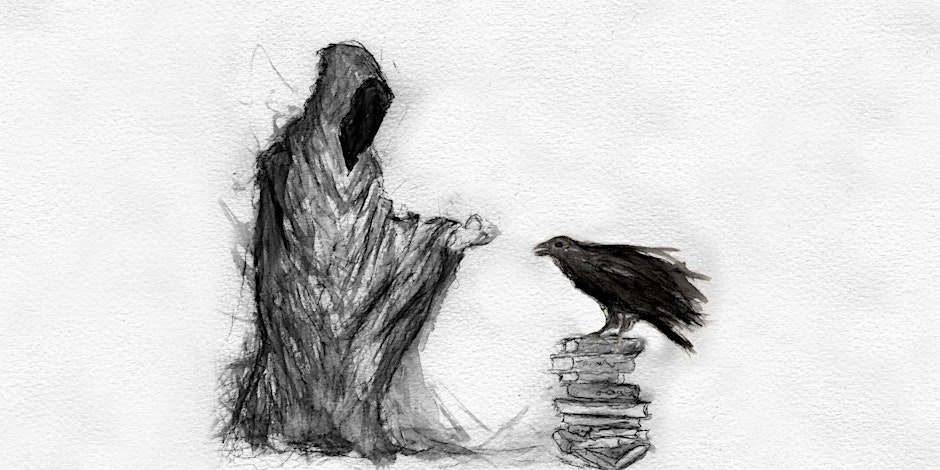Watch Where You Look: Orpheus Learns About Narcissism in ‘Lillian’s Thief’

Please note this review mentions sexual abuse.
Despite getting tuned up with a modern setting, Lillian’s Thief: A Modern Orpheus can’t help but look back to classic, old-fashioned tropes.
The play was written by and stars both Sara Beck as Morana and Christian Milanovic as Corvin, with direction by Abby Wolfe and produced in association with Not So Amateur Amateurs.
Beck and Milanovic have a clear connection and rapport that lends itself to the performance (although their characters spend a lot of the time in mutual animosity), bolstered by their collaborative writing work. I was intrigued by their creative partnership and they evidently had a good working dynamic together.
The play begins with a hapless youth, Corvin, stumbling into a cottage kitchen that turns out to belong to a middle-aged Scottish lady who is essentially the Grim Reaper (although she prefers to go by her proper name, Morana). Corvin, with his own troubles centering on the loss of his girlfriend—maybe wife?—Lillian, has a bone to pick with Morana, and the play focuses on the conflict between the two as they work through these difficulties between glasses (swigs) of whiskey and cups of lemon balm tea. This conflict feels like one step into the classic hero’s journey, without much of an actual journey to speak of. The play felt a bit like one piece of a larger whole and didn’t add much innovation to the tale it’s inspired by, instead leaning on stereotypes.
The play’s major theme is grief, which it ambitiously tries to tackle in about ninety minutes. It doesn’t progress much farther in the stages of grief than anger and possibly acceptance, with a lot of volume in lieu of varied emotions. The play, of course, hinges on Corvin’s loss of Lillian, a trope of a man’s backstory involving the tragic loss of a woman who we never meet and who is essentially a Mary Sue character. Once again tapping into the hero’s journey, which often involves a tragic backstory, particularly one with the loss of a woman who was very close to the typically male hero (either by relation or by romance). As the story goes, the male hero struggles with this loss but develops character by working through this hardship. However, Corvin’s development is largely unconvincing as the script favours one-dimensional characterization over nuance. While the play is of course inspired by the Orpheus myth, which involves the loss of his lover Eurydice, it could have done something a little more innovative with the tale rather than doubling down on ancient tropes.
In addition, the script takes the tragic backstory involving loss even further by including a very unnecessary and discordant backstory of child rape with Morana as a survivor. For one thing, Morana is a solid character (a bit one-dimensional, but not as much as Corvin) without any backstory and doesn’t need this history to be a strong presence. More importantly though, women don’t need to have a traumatic backstory or be the collateral damage in a man’s trauma in order to have character or experience or knowledge of the world. This additional backstory seems to have been given to Morana in order to make Corvin sympathize with her and see her as a real person with her own struggles (instead of a supernatural entity), more than to add to her character, once again centering on Corvin and his experiences of others rather than making them three-dimensional individuals in their own right.
Corvin and Morana are both characterized as avid readers, and the script is littered with literary references (although perhaps a little too obtrusively), ranging from Christina Rossetti, Emily Dickinson (not too complimentary, I might add), Dante, Virgil (of course), Mary Shelley, and Robbie Burns (did I mention Morana is Scottish?). Corvin and Lillian apparently met and fell in love stealing glances at each other while reading in the same hallway at university. Meanwhile Morana passes the time and recovers herself from a long day’s work by reading—she goes toe to toe with Corvin over quotations and references, which makes sense given Beck and Milanovic co-wrote the play. These literary references seemed like an attempt at being highbrow, but ended up feeling a little too meta for such a straightforward play. (Or maybe I’m just touchy about Dickinson slander.)
Given the setting is solely Morana’s kitchen, the set requires a lot of heavy lifting and it is aptly suited to the challenge. It is a witchy cottagecore dream, centering around a beautiful wooden table in front of an old-fashioned fireplace. The set is also full of shelves covered with different tchotchkes, notably the jars of souls that Morana shepherds to and from the land of the living. It felt suitably cozy and lived in, and made me want to sit down and have some tea (or maybe something stronger) with Morana.
While well-executed and performed, the play could have used a stronger script with a bit more development in the characters’ drama and backstories without relying on shortcuts and tropes.
‘Lillian’s Thief: A Modern Orpheus’ played at Domino Theatre from July 24-26, 2024. For more information, click here.
